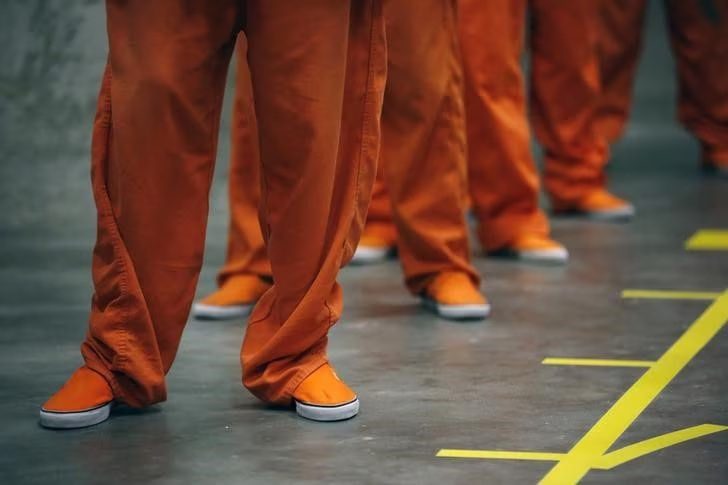US prisons rife with human rights abuses, especially against Black people, UN says
By Hassan Kanu
On October 4, 2023

A U.N.-appointed panel issued a report last week documenting “shocking” violations of basic human rights and pointing to “staggering” racial disparities that place the U.S. criminal justice system in a singular category on the world stage.
Practices that are routine in U.S. prisons, like shackling women during childbirth and unpaid forced labor, are an “affront to human dignity,” and represent the “worst version of a racist criminal legal system” that perpetuates slavery to the present day, according to the U.N. report, which was published on Sept. 28.
The group of three experts condemned other rights violations, expressing alarm that solitary confinement, false arrests and disenfranchisement due to arrest have now become “generalized practice” in the U.S. They called for major reforms and made numerous specific policy recommendations, including withdrawing armed officers from routine traffic enforcement and from schools.
The panel included Yvonne Mokgoro, a former justice of the Constitutional Court of South Africa and chairperson of the Nelson Mandela Children’s Fund; Juan Mendez, a human rights law professor at the American University-Washington College of Law and former U.N. Special Rapporteur on torture and inhuman treatment; and Tracie Keesee, a former police veteran and administrator who is now president at the Center For Policing Equity. The report was based on an investigation that included visits between April and May to detention centers in Washington, D.C., Atlanta, Los Angeles, Chicago, Minneapolis and New York, and testimony from officials and 133 affected individuals.
“We reject the ‘bad apple’ theory,” and recognize “evidence suggesting that the abusive behavior of some individual police officers is part of a broader and menacing pattern,” said Mendez in a Sep. 28 announcement.
The U.S. diplomatic mission in Geneva, which represents the U.S. in international organizations and treaties, didn’t respond to a request for comment.
Besides the horrific nature of the practices documented, perhaps the most striking aspects of the report are the stark racial disparities among the subjects of the worst rights violations, including practices that are rarely documented in comparable countries.
In other words, the U.N. report shows not only that the U.S. criminal justice system is pervaded by certain uniquely inhumane practices, but also that the worst of those abuses are often reserved for non-white Americans – and especially Black people. That dynamic is a clear reflection of systemic discrimination and other legacies of our history of slavery and legalized apartheid, as the panel put it.
The U.S. “is the only country in the world that sentences children to life without parole,” for example, the panel wrote in the report. Worse still, data shows that 62% of juveniles serving life without parole are of African descent.
Those kinds of disparities also are reflected in the available data about virtually all of the most appalling rights abuses, including mistreatment of pregnant women, use of “incommunicado detention” – false arrests that are not officially acknowledged, often accompanied by other ill treatment – and forced, unpaid labor.
Experts wrote that they were “astonished” to see that access to a “free or almost free Black work force” exists to this day. Most of the prisoners who pick cotton at Louisiana’s Angola prison, a former slave plantation, are Black, and “under the watch of white ‘freemen’ on horseback,” the panel observed.
Representatives at the Louisiana State Penitentiary didn’t respond to my request for comment.
Louisiana’s prison population is about 66% Black, even though Black residents only account for 32% of overall population, according to the Prison Policy Initiative.
Although it isn’t noted in the U.N. report, Louisiana officials also have a practice of deliberately keeping people in jail well past their release dates. And many states still trade prisoners throughout the country – much like the convict leasing system that partly replaced slave labor after the Emancipation Proclamation.
Authorities and business-people who support Louisiana’s system of forced labor have repeatedly sought to justify the practice with essentially the same “necessary evil” arguments made two hundred years ago by plantation owners, as legal scholar Michele Goodwin observed in a 2019 law review article on mass incarceration and “modern slavery.” Goodwin is a professor at the University of California, Irvine School of Law.
The same dynamics persist with regard to other patterns documented by the U.N. panel.
Black women prisoners represent 34% of all incarcerated women and are more likely to be restrained and shackled than their white counterparts, the panel wrote.
A U.N. spokesperson told Reuters that the panel became aware of “several” cases where pregnant women lost their babies due to being shackled, and that all involved Black women.
The U.N. report also discussed “incommunicado detention,” or arrests made without providing access to a lawyer or even information about the whereabouts of the detainee – another egregious category of rights violations that reflects similar disparities.
The panel singled out a “generalized practice” at Homan Square police facility in Chicago between 2004 and 2015, citing news reports that revealed an off-the-books warehouse that police officers used for interrogation and incommunicado detention.
The Chicago Police Department has said that the claims about the facility were inaccurate.
Of the thousands detained at the facility over a decade, 82% were Black, according to a news report in The Guardian in August 2015, which the U.N. panel relied on. Just two of the 22 individuals who described being held there said they were actually allowed to call relatives and attorneys – and both were white.
The report is yet another affirmation of how deeply systemic racism and anti-Blackness runs in our criminal justice system, and of the urgent, continuing need for institutional changes.
This piece was republished from Reuters.